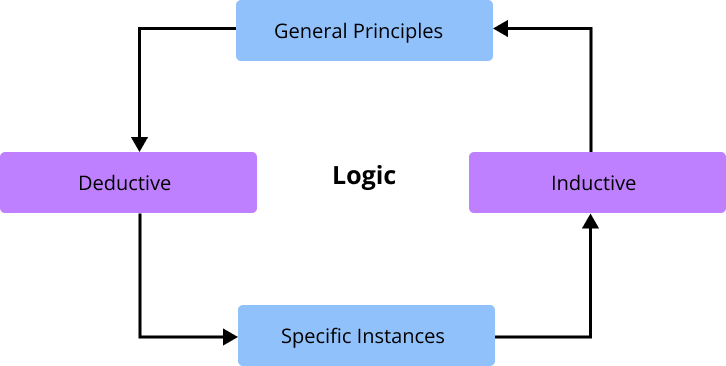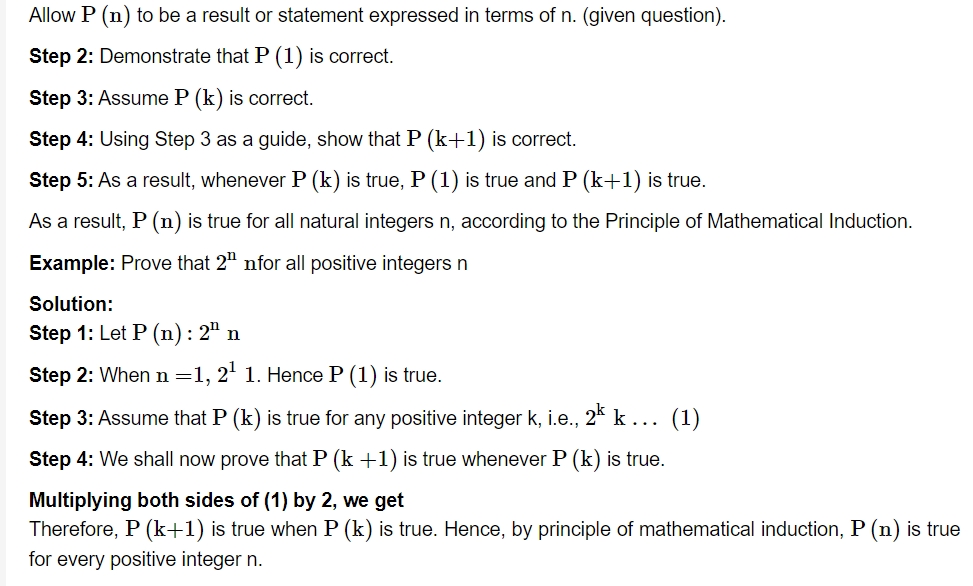
CBSE Class 11 Maths Notes Chapter 4: The Principle of Mathematical Induction, CBSE Class 11 Maths Notes Chapter 4, is available online from here and follows the most recent syllabus. You can answer numerical problems more quickly by using the shortcut strategies included in our Mathematical Induction Notes.
Because of this, using our CBSE Class 11 Maths Notes Chapter 4 will also help you get higher exam grades. Additionally, you have the chance to strengthen your foundational knowledge with our Mathematical Induction Class 11 Notes, which include thorough explanations of key concepts.CBSE Class 11 Maths Notes Chapter 4 Overview
A specialized method of working through several examples and making observations is mathematical induction. The compilation of a specific set of facts is called induction. With the help of this technique, we can evaluate the validity of a variety of claims. For mathematical induction to function with an infinite set, the set must be denumerable, which means that there must be a one-to-one connection between the elements of the set under consideration and the set of positive integers. In simple terms, this method expresses the set in the form of an implied list of discrete elements such as {1, 2, 3, 4, …}.CBSE Class 11 Maths Notes Chapter 4 PDF
A certain method called mathematical induction is mostly employed to support a theorem or assertion. A key component of this approach is that the theorem should hold for any natural integer. This approach is helpful since it spares you from having to solve a statement or equation for every potential value. Here we have provided CBSE Class 11 Maths Notes Chapter 4 PDF for the ease of the students.CBSE Class 11 Maths Notes Chapter 4 PDF
Induction
There are two principles of Mathematical Induction, which you need to know right from the beginning. They are:
-
Deduction
-
Induction
Example:
1. Deduction: In here, you are provided with some facts or statements, out of which you are required to deduce or derive a particular statement or information. It is similar to deciphering the required information from the data.
For instance, consider this example-
Statement 1: Rohit is a man.
Statement 2: All men eat food.
Conclusion: Rohit eats food.
The two facts above aid in concluding that Rohit is one of the men who eats food, as you can see in our Mathematical Induction Notes.
Induction: Herein, you will be provided with statements that signify specific instances, out of which you are likely to draw conclusions related to generalizations.
Consider this example-
Statement 1: Rohit eats food.
Statement 2: Vikas eats food.
Statement 3: Rohit and Vikas are men.
Conclusion: All men eat food.
As can be shown, the three provided statements—which are particular cases—may be used to conclude. As a result, from here you can infer a generalization. To make sure you understand both topics, make sure you read through every line in our Mathematical Induction Notes. Furthermore, we have provided a mathematical inference for the same. It will facilitate a more organic understanding of the ideas. We have provided the procedure with the aid of algebraic representations since the primary goal of this approach is to solve numerical problems.For instance,
If a statement is valid for a value of n, where n = 1,
And again, the same statement is true for another value, say n = k,
Once again, it is valid for n = k +1,
Since one assertion is true for each of the aforementioned values, it stands to reason that it will also be true for every other value of n, given that they are all natural integers. For a more rational explanation of the same, see our Mathematical Induction Notes. We have created a figure that summarises the basic concept of induction and deduction and has the appropriate labels.Specific Instances to Generalization


Steps of Principle of Mathematical Induction

Students need to be familiar with the following pointers when studying Mathematical Induction
- The main goal is to demonstrate a certain claim or example.
- The proof ought to hold for any value made up of natural numbers.
- Additionally, the statement needs to hold for the starting value.
- Up to the nth iteration, it needs to hold for all other values.
- Every step in the proof needs to be true and supported.
Benefits of CBSE Class 11 Maths Notes Chapter 4
You can get better at the fundamentals if you download and work through our Class 11 revision notes. The various subjects covered in the book can be succinctly summarised in the notes. Students don't need to depend on many sources to complete their exam preparation. Every chapter includes a precise and verifiable explanation of the subjects covered. Not to mention, there are significant textbook problems and other supplementary questions that students can solve in the revision notes. They will get a thorough understanding of the chapter from this. The revision notes are another tool that students can use to get their questions answered. They will be able to concentrate on the areas where they make mistakes and effectively communicate their ideas. They will also benefit from this in terms of improving their response techniques. It gets harder for the students to finish reading the chapters and the textbook during exam season. However, students will be able to simply finish all the chapters and their curriculum before exams with the help of the rapid CBSE Class 11 Maths Notes Chapter 4. When it comes to aiding students in remembering material they may have forgotten, these revision notes are invaluable. For example, you can download the CBSE Class 11 Maths Notes Chapter 4 from here if you need to remember the solution to a question from here.CBSE Class 11 Maths Notes Chapter 4 FAQs
Which is the hardest chapter in maths class 11 CBSE?
Which is the most scoring chapter in class 11 maths?
Which is the easiest subject in PCM?









